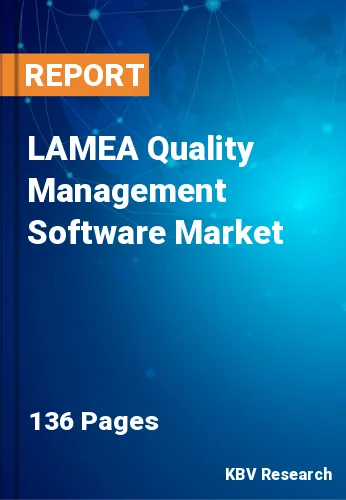The Latin America, Middle East and Africa Quality Management Software Market would witness market growth of 12.9% CAGR during the forecast period (2021-2027).
The increasing significance of customer-centric production and rapid changes in regulations & standards, which require frequent compliances are supporting the growth of the market. Registering for ISO 14001, ISO 90001, and other international standards is one of the important aspects for companies to operate their businesses across the world since these standards enable them to fulfil the demands, legislative requirements, competitive pricing, and to meet the customer requirements. QMS solution vendors are aimed at improving sustainability practices to assist organizations to minimize wastes and carbon footprint.
Companies implement these QWS solutions to support their processes with standards like United Nations’ Sustainable Development Goals (SDGs) to decrease carbon emissions. As QMS solutions provide numerous advantages to the customers, it also includes some challenges like the absence of effective integration capabilities, which leads to misalignment with the prevailing IT infrastructure of end-users. Though, providers have actively been trying to solve these issues, the extensive acceptance of cloud-based deployment of QMS is estimated to solve these challenges over various industries & verticals.
Various standards & regulations are prevailing in the various countries of LAMEA such as ISO certification in South Africa for ISO 9001 Quality Management Systems, which helps organizations to achieve all the evidence of their compliance with the needs of the ISO 9001 standard. These ISO certifications enable the companies in South Africa to demonstrate their capabilities, promise ongoing quality control & customer service, and uniformity in quality to their international trading partners.
Several European companies need their trade partners to get the ISO certificates like certification in South Africa that helps the organizations, which obey the regulations to attain a competitive edge across companies, which don’t have ISO 9001 QMS compliant systems on premise. The quality management software market in LAMEA would showcase a significant growth rate during the forecast period.
The Brazil market dominated the LAMEA Healthcare Quality Management Software Market by Country 2020, thereby, achieving a market value of $54.3 million by 2027, growing at a CAGR of 13 % during the forecast period. The Argentina market would witness a CAGR of 14.8% during (2021 - 2027). Additionally, The UAE market is expected to witness a CAGR of 13.9% during (2021 - 2027).
Based on Solution Type, the market is segmented into Complaint Handling, Document Control, Audit Management, Non-conformances/Corrective & Preventative, Change & Calibration Management, Supplier Quality Management, Employee Training and Others. Based on Enterprise Size, the market is segmented into Large Enterprise and Small & Medium Enterprise (SME). Based on Deployment Type, the market is segmented into On-premise and Cloud. Based on End User, the market is segmented into Manufacturing, Telecom & IT, Consumer Goods & Retail, Healthcare, Transportation & Logistics, Aerospace & Defense and Others. Based on countries, the market is segmented into Brazil, Argentina, UAE, Saudi Arabia, South Africa, Nigeria, and Rest of LAMEA.
Free Valuable Insights: The Global Quality Management Software Market is Predict to reach $16.9 Billion by 2027, at a CAGR of 9.5%
The market research report covers the analysis of key stake holders of the market. Key companies profiled in the report include Honeywell International, Inc. (Sparta Systems, Inc.), SAP SE, PTC, Inc. (Arena Solutions, Inc.), Plex Systems, Inc., Cority Software, Inc. (Thoma Bravo), Oracle Corporation, Siemens AG, Dassault Systemes SE (Biovia Corporation), Microsoft Corporation, and MasterControl, Inc.
By Solution Type
By Enterprise Size
By Deployment Type
By End-User
By Country
Our team of dedicated experts can provide you with attractive expansion opportunities for your business.

